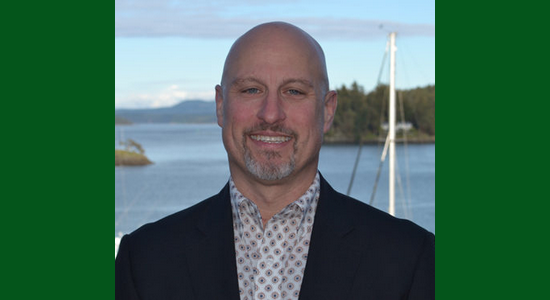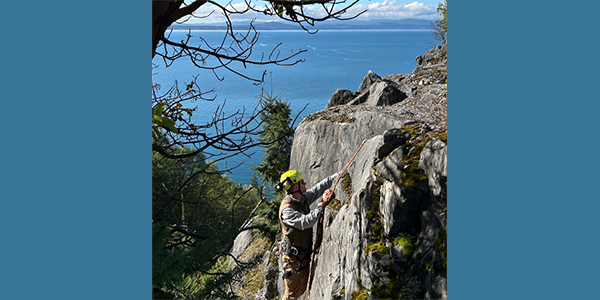— from Crosscut.com —

On a clear Saturday morning in July, I called the Saltwater Café in Point Roberts, Washington. The café is usually crowded with dozens of customers seated inside and out on the patio, taking in the view of the Gulf Islands across the Salish Sea and enjoying the salty breeze from the beach across the street. “On a normal weekend, you can’t get a seat,” said owner Tamra Hansen. But on the morning she talked to me, just one table was occupied; business has been down 75% since the COVID-19 pandemic hit.
Across the U.S., businesses and communities are struggling. But Point Roberts is in a unique position — not just figuratively, but geographically. Located on the tip of the Tsawwassen Peninsula, the town falls entirely below the 49th parallel, the line that separates Canada and the U.S. To reach the closest town in the mainland U.S., Point Roberts residents must cross into Canada through a border checkpoint at the northern end of town, drive about 25 miles, then cross back into the U.S. through yet another checkpoint near Blaine, Washington.
Usually, those crossings are a mere formality; before the pandemic, it wasn’t uncommon for U.S. and Canadian citizens to cross the border several times a day for sports practices, shopping trips and visits. But since officials restricted cross-border travel in March, Point Roberts’ roughly 1,000 full-time residents find themselves unexpectedly isolated, estranged from their usual lifestyle. Now, the invisible line dividing the two countries stands in the way of what was once an easy drive, and after four months of the pandemic, people on the Point miss the things they used to take for granted. “It’s very odd to be seven minutes away,” said Jessie Hettinga, a Point Roberts resident. “That was your life, but now, that’s not a possibility.”
It’s a common misconception that Point Roberts was a mistake; people often assume that when the U.S. and Great Britain signed the 1846 Oregon Treaty, which established the 49th parallel as the border between the two nations’ territories, land surveyors didn’t realize they were carving off Point Roberts from Canada. But the choice was intentional, meant to serve as a strategic advantage for the U.S., said Mark Swenson, treasurer of the Point Roberts Historical Society and author of Point Roberts Backstory, a history of the town.Related: Border closure separates families between Washington and Canada
As a result, Point Roberts has always had a fluid relationship with its Canadian neighbors. “We’re a community with one foot in both countries,” Swenson said. “We rely on each other.” During Prohibition, for instance, Point Roberts was a key rum-running port. “There was a speakeasy and brothel right on the border, on the Canadian side of the line, and the window opened into Point Roberts,” Swenson said. The tables turned in the ’60s, when Canadians began visiting Point Roberts to purchase alcohol because of a British Columbia law prohibiting its sale on Sundays, until the law was changed in 1986 for the World Expo in Vancouver. “You could have 10,000 Canadians in Point Roberts on any given Sunday through the ’60s, ’70s and early ’80s,” said Swenson.
Now, however, most visits are prohibited. Residents of Point Roberts can cross the border only to work, pick up prescriptions or go to a doctor’s appointment in the mainland U.S., and they’re not allowed to stop in Canada at all during the trip. The only other way to reach the mainland is by private boat, or the twice-weekly $135 flight to Bellingham.
Since the boundary was established, Swenson said, border restrictions have never been as prolonged as the current ones — which will continue through August, if not longer, Even the closure following the 9/11 terrorist attacks lasted less than a day. The isolation “starts to wear on people,” said Christopher Carleton, the town’s fire chief. “That’s the point we’re at now: It’s leading to higher depression, and a lack of physical contact is causing a small crisis within my community.”
In July, Carleton wrote to President Donald Trump, Canadian Prime Minister Justin Trudeau and other government officials, urging them to “recognize the unique circumstances” of Point Roberts and find a way to allow more open transit. Previously, two petitions on Change.org seeking to expand the list of activities that justify border crossings garnered thousands of signatures. One of the petitions, created by Canadian resident Kevin McIntosh, requested that Canadians with homes, boats or livestock in Point Roberts be allowed to cross into the U.S. to take care of their property; he wrote that he was concerned that his “Canadian-licensed pleasurecraft” moored in Point Roberts might sink without proper maintenance. After five weeks, McIntosh gave up waiting for an answer. On an update to his petition page, he described how what used to be a few minutes’ drive had turned into a full day’s journey: He flew from Vancouver to Seattle, rented a car to drive about 100 miles north to Bellingham, took the afternoon flight to Point Roberts and then spent a few days repairing his boat before sailing home.
The lack of tourists this season has affected the many local businesses that depend on Canadians’ money. Dean Priestman, manager of Point Roberts International Marketplace, the only full-service grocery store in town, said that he normally has so many customers in the summer that it’s hard to keep the alcohol selection stocked. This year, however, overall sales are down. While demand for some products remains — Priestman said he’s gotten some niche requests from Canadians for items they can only get in the U.S., like Grape-Nuts, specific flavors of Tim’s Cascade Potato Chips or Tillamook butter and cheese — the cost of international shipping has deterred such orders. “It’s usually a hustle-and-bustle place, but it’s not right now,” Priestman said. “It’s quiet.”
READ FULL ARTICLE: https://crosscut.com/environment/2020/08/coronavirus-cuts-washington-border-town-two-countries
**If you are reading theOrcasonian for free, thank your fellow islanders. If you would like to support theOrcasonian CLICK HERE to set your modestly-priced, voluntary subscription. Otherwise, no worries; we’re happy to share with you.**







